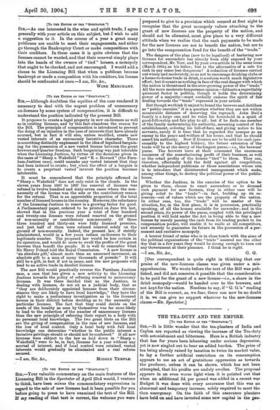understand the position indicated by the present Bill.
It proposes to create a legal property in new on-licenses as well as in existing licenses, and by this fact abandons the reason for the Bill. The principle of compensation is introduced to prevent the doing of an injustice in the case of interests that have already accrued, but in fact it will also, unless modified, create new vested interests of an enormously lucrative character. There is something distinctly unpleasant in the idea of legalised bargain- ing for the possession of a new vested license between the great brewers and Quarter Sessions. Such bargaining was just tolerable when the Licensing Justices, by virtue of the decisions given in the cases of "Sharp v. Wakefield "and "R. v. Howard" (the Farn- ham Justices case), could unmake any vested interest that they had been induced to create ; but when the effect of a bargain is to create a perpetual vested interest the position becomes intolerable.
It must be remembered that the principle affirmed in " Sharp v. Wakefield" does not only exist in the clouds. In the eleven years from 1887 to 1897 the renewal of licenses was refused in twelve hundred and sixty-seven cases where the non- necessity of the license was the sole or the contributory reason for the refusal. That is an appreciable proportion of the total number of licensed houses in the country. Moreover, the reluctance of the Licensing Justices to renew is a growing factor for good. A Parliamentary paper, ordered to be printed on June 9th last, showed that in the previous year a total of four hundred and twenty-one licenses were refused renewal on the ground of non-necessity or contributory non-necessity. Of these three hundred and thirty-six were fully licensed premises, and just ball of them were refused renewal solely on the ground of non-necessity. Indeed, the present law, if strictly administered, would in a few years reduce on-licenses to their legitimate number. The proposed law would be less certain in its operation, and would do more to swell the profits of the great brewers than benefit the people. It is well to remember what Sir Harry Poland told the Royal Commission. "A new license is 'in absolute gift,' almost more than an unearned increment, an absolute gift to a man of many thousands of pounds." It will still be a gift, in fact if not in name, and the new proposals will lead to an active trade in derelict licenses.
The new Bill would practically reverse the Farnham Justices case, a case that has given a new activity to the Licensing Justices towards the policy of refusing renewal to unnecessary licenses. It was there decided that as the Justices, in dealing with licenses, do not sit as a judicial body, that as "they are deliberately appointed because from their circum- stances they are likely to have local knowledge," they have the right to make a preliminary investigation as to the licensed houses in their district before deciding as to the necessity of particular licenses. The fact that they could decide on the needs of the locality as seen by themselves was far more likely to lead to the reduction of the number of unnecessary licenses than the new principle of referring their report to a body with no personal local knowledge. The two great blots on the Bill ,are the giving of compensation in the case of new licenses, and the loss of local control. Only a local body with full local knowledge can determine "whether in the public interest a lucrative privilege should or should not be conferred." If all new licenses were subject to the law as laid down in "Sharp v. Wakefield," were to be, in fact, licenses for a year without any accrual of interest, and if local control were retained, vested interests would gradually be eliminated and a real reform secured.
• —I am, Sir, &e., MIDDLE TEMPLE.






















































 Previous page
Previous page